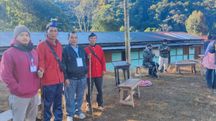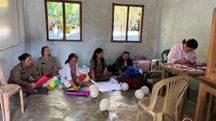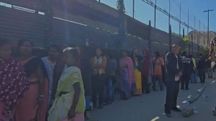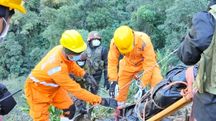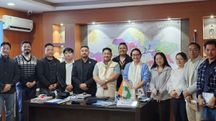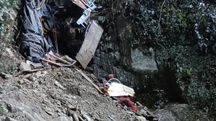Arunachal Government to constitute high-level committee to enquire into the APPSC scam
The cabinet was briefed on the paper leakage matter of recruitment of APPSC and it was decided to constitute a high-level committee to enquire into the entire episode and submit a report within 15 days
 Arunachal Cabinet
Arunachal CabinetArunachal Chief Minister Pema Khandu chaired the monthly cabinet meeting today for ensuring an accelerated pace of development and timely decision to make difference on the ground.
The cabinet was briefed on the paper leakage matter of recruitment of APPSC and it was decided to constitute a high-level committee to enquire into the entire episode and submit a report within 15 days.
The Cabinet approved the proposal of taking over of the DBT-APSCS&T Centre of Excellence for Bioresources and Sustainable Development (DBT-APSCS&T CoE for BRSD) established under the aegis of Arunachal Pradesh State Council for Science and Technology at Kimin by the State Government along with infrastructure and existing manpower w.e.f October 2022 for the furtherance of biotechnological research and sustainable development of bioresources in the state.
The Centre of Excellence has been established with financial assistance and support from the Department of Biotechnology, Ministry of Science and Technology, Government of India on ‘As is where is Basis’.
The council has taken over for a period of 5 years during which time the centre will work towards self-sustenance.
Cabinet decided to increase the existing rates of Excise Duty by 15% only on all types of hard liquor (Indian Made Foreign Liquor-IMFL and Bottled In Original-BIO products) to be paid before import or removal from the manufacturer.
The rates of Excise Duty in respect of Military/Paramilitary Units shall be 50% of the rates of Excise Duty fixed to be paid before import or removal from the manufacturer.
Cabinet reviewed the ongoing exercise of resolving the Assam-Arunachal Boundary and decided to amicably resolve the matter at the earliest.
Cabinet was further briefed on four major agendas on 28 Action Points, 100 % Saturation of 13 Centrally Sponsored schemes (CSS), Mission Amrit Sarovar, and PM Gati Shakti.
The 28 Action Points covered issues such as the contribution of the State in making India a $5 trillion economy, Ease of Living & Ease of Doing Business focusing on DBT integration with Aadhar enablement, sound GST administration, and reducing compliance burden by repealing old laws. A strong emphasis was given to the use of drone technology and improving State intelligence.
The Cabinet was also briefed about the implementation status of NEP 2020 with a special focus on the skill development of the youth. The use of social media effectively for promoting and spreading awareness about various Government schemes and programmes was also briefed.
Briefing was also done about the saturation status of 13 CSS schemes including Prime Minister AwasYojana (Urban & Rural), Jal Jeevan Mission, PMJan Arogya Yojana, PMGram Sadak Yojana, PM Kisan Samman Nidhi, PM Jeevan Jyoti Beema Yojana, SVAMITVA, BharatNet II, Soil Health Card, Kisan Credit Card, Atal Pension Yojana, and SVANidhi.
The Cabinet reviewed the progress of these schemes month-wise and district-wise as per the set saturation targets to ensure the timely saturation of these schemes.
The Cabinet was informed about the status of Mission Amrit Sarovar, a new initiative launched by the Prime Minister with a view to conserving water for the future. The mission is aimed at developing and rejuvenating 75 water bodies in each district of the country as a part of the celebration of Azadi ka Amrit Mahotsav.
A briefing was also done on PM Gati Shakti in line with the national master plan to lay the foundation of overall infrastructure and an integrated development path of the economy.
Decisions regarding projects related to GATI SHAKTI, Institutional arrangements like Constitution of Empowered Group of Secretaries (EGoS), Network Planning Group (NPG) and Technical Support Unit (TSU), framing of State Logistics Policy, integration and authentication of data layers among various ministries and sectors like Railways, Roadways, Ports, Waterways, Airports, Mass Transport, and logistics Infrastructure was communicated to the Cabinet.
Copyright©2025 Living Media India Limited. For reprint rights: Syndications Today
